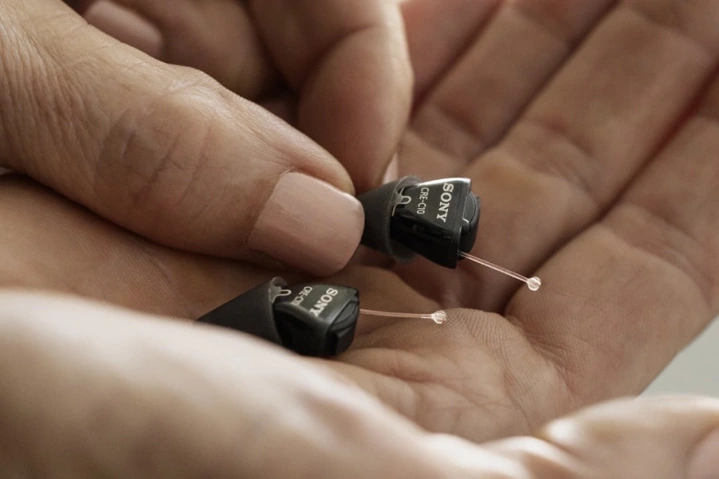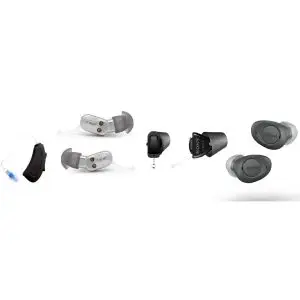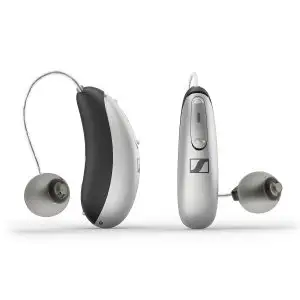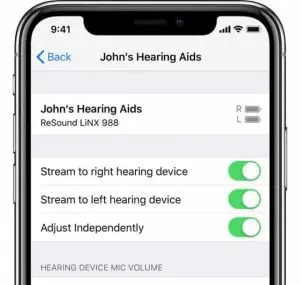If you’re exploring hearing aid options, you’ve likely encountered Over-the-Counter (OTC) devices. OTC hearing aids are gaining popularity among individuals with mild to moderate hearing loss who seek an affordable and less time-consuming alternative to prescription devices. But how do they differ from traditional, prescription hearing aids? This blog post aims to clarify these differences by examining the features, performance, cost, availability, convenience, and more of both types of devices. If you wish to make an informed decision about your auditory healthcare needs, read on!
Understanding Over-the-Counter (OTC) Hearing Aids
OTC hearing aids serve as a convenient and cost-effective solution for individuals with mild to moderate hearing loss. You don’t need a prescription or a visit to an audiologist to access these devices. OTC hearing aids boast user-friendly designs, allowing wearers to adjust volume and settings independently. These aids may not suit those with moderate or severe hearing loss, but they provide a cost-efficient option for improving hearing. Advances in technology have even enabled OTC hearing aids to offer features like noise reduction and Bluetooth connectivity, which were previously exclusive to traditional hearing aids. Always consult your doctor or audiologist before purchasing an over-the-counter hearing aid to ensure it suits your specific needs.
Differences Between OTC Hearing Aids and Regular Hearing Aids
As hearing loss becomes increasingly common, so do the corrective options. People can now choose between prescription hearing aids and OTC options. Prescription hearing aids necessitate a visit to the audiologist and can come with a hefty price tag, whereas you can buy OTC hearing aids at a lower cost and without a prescription. However, OTC hearing aids might not serve those with severe sensorineural hearing loss effectively. Comparing and contrasting these two options can help individuals make a decision that fits their specific hearing needs. A hearing healthcare provider or an audiologist can guide this decision-making process.
Advantages of OTC Hearing Aids
Many people struggle with hearing loss, but not everyone can afford expensive hearing aids. This is where over-the-counter (OTC) hearing aids come in. They provide a more affordable solution for those who need auditory help. You can buy OTC hearing aids without a prescription, and they come in a variety of styles and price points. They allow individuals to tailor their hearing needs without incurring the cost of a specialist visit. Furthermore, OTC hearing aids are easy to use and offer a discreet option for those who prefer to keep their hearing aid usage private. In sum, OTC hearing aids provide a cost-effective and convenient alternative for those looking to improve their hearing.
Possible Disadvantages of Using an OTC Hearing Aid
While over-the-counter hearing aids may appear as a convenient and affordable solution for those with hearing loss, there are potential drawbacks to consider. Unlike prescription hearing aids, OTC options are not tailored to an individual’s specific hearing needs, meaning they might not effectively enhance their hearing. In addition, OTC hearing aids might not provide the same level of comfort as prescription options, potentially causing discomfort or even pain with extended use. Before deciding on the best course of action for your hearing health, it’s crucial to weigh the benefits and drawbacks of both options. Consulting with an audiologist about your choices can also be beneficial.
Tips for Selecting the Right OTC Hearing Aid
Hearing loss affects millions of people globally, and many are now opting for over-the-counter hearing aids, or OTCs. While an OTC may not equal a professional hearing aid, it can still be effective and much more affordable. Choosing the right OTC hearing aid can be tricky. Consider factors like comfort, sound quality, and amplification level. Not all OTC hearing aids will produce the sound you prefer. To ensure you get the best device for your needs, do your research, read reviews, and seek professional advice. With the right OTC hearing aid, you can enjoy clearer, more vibrant sound and an improved quality of life.
What to Consider When Shopping for an OTC Hearing Aid
With the rise of over-the-counter hearing aids, it’s important to know what to look for to make the best purchase. These devices might seem like a quick fix, but not every over the counter hearing aid is created equal. It’s essential to do your research and consider factors such as sound quality, comfort, and cost when shopping. Thankfully, hearshearingandhearables.com offers detailed reviews and comparisons to assist you in your decision-making process. Don’t settle for subpar hearing aids – invest time to find the perfect fit for your needs and budget.
In conclusion, over-the-counter hearing aids present an excellent choice for individuals with mild to moderate sensorineural hearing loss. These aids offer not just affordability but also more freedom and independence when compared to regular hearing aids. Despite potential drawbacks like limited sound quality and lack of customization options, many consumers find that an OTC hearing aid perfectly fits their needs.
Knowing how to choose the right OTC hearing aid is crucial. Therefore, staying informed before making a purchase becomes key. With the knowledge of available market options and the necessary features to look for in an over-the-counter device, consumers can confidently select an OTC device that best aligns with their lifestyle.
If you’re seeking an affordable yet efficient solution for managing hearing loss, consider exploring our selection of over-the-counter Hearing Aids. Shop our online collection today to regain balance in your life! As you progress, you might find yourself ready for a prescriptive hearing aid. In our upcoming blog posts, we’ll discuss the importance of treating your hearing loss sooner rather than later,








